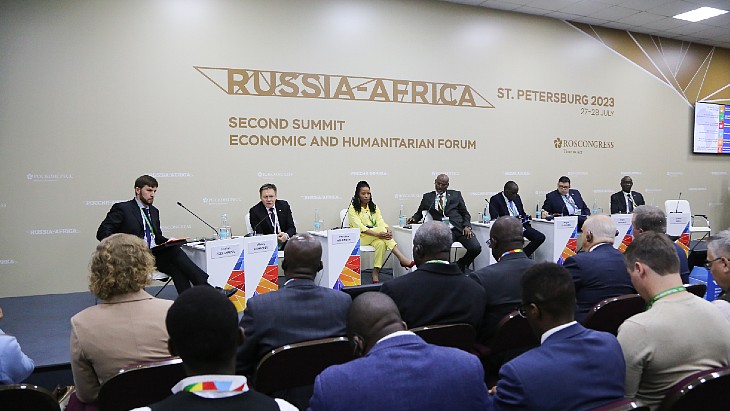Podcast: The prospects for nuclear energy in Africa
The main interview is with Lassina Zerbo, who discusses the current situation, and the emerging future plans, for nuclear energy in Africa. There are also reports on China's molten salt reactor and the USA's HALEU fuel supply initiatives.
Lassina Zerbo is the former head of the Comprehensive Nuclear Test Ban Treaty Organization and current chairman of the Rwanda Atomic Energy Board - he joins us to discuss the current situation and look ahead to the future.
He talks about the history and considers why there is only one country in the continent with an operating nuclear power plant, and how changes in public opinion and nuclear technology are helping to drive a wide range of planned developments. Director of World Nuclear Association's Harmony programme, King Lee, also outlines some of the many initiatives taking place which could transform the nuclear energy picture in Africa in the years to come.
June has been another busy month for World Nuclear News and Warwick Pipe reports on developments with China's molten salt reactor, while Claire Maden sets out the USA's efforts to tackle the issue of HALEU fuel supplies for the next generation of nuclear reactors.
Listen and subscribe on all major podcast platforms
World Nuclear News podcast homepage
Spotify
Apple
Amazon Music
Google
Stitcher
Castbox
Researched and written by World Nuclear News
Zimbabwe and Ethiopia sign nuclear energy cooperation agreements with Russia
28 July 2023
Two more countries - Zimbabwe and Ethiopia - have signed agreements with Russia to cooperate on the peaceful use of nuclear technology on the sidelines of the Russia-Africa Economic and Humanitarian Forum, which has been taking place in St Petersburg.
 (Image: Rosatom)
(Image: Rosatom)The intergovernmental agreement between Russia and Zimbabwe - which follows a memorandum of understanding concluded in September 2021 - was signed by Rosatom Director General Alexei Likhachev and Zimbabwe's Energy Minister Soda Zhemu.
Rosatom said: "It establishes a legal framework for cooperation between Russia and Zimbabwe in the peaceful use of atomic energy in a wide range of areas, such as assistance in the creation and improvement of Zimbabwe's nuclear infrastructure in accordance with international guidelines; regulation in the field of nuclear and radiation safety, production of radioisotopes and their use in industry, medicine and agriculture; cooperation in areas of application of radiation technologies and nuclear medicine, education, training and retraining of specialists for the nuclear industry."
Also on the sidelines of the forum, Russia and Ethiopia signed a roadmap for bilateral cooperation in the use of atomic energy for peaceful purposes. According to Rosatom: "The roadmap defines specific steps that the parties will take in 2023-2025 to explore the possibilities of building a nuclear power plant of large or small capacity, as well as a Nuclear Science and Technology Center in Ethiopia. The parties plan to work together to develop Ethiopia's national nuclear infrastructure, organise technical tours and seminars, and meetings of specialised working groups."
On Thursday it was announced that Russia and Burundi had signed a memorandum on cooperation on peaceful use of nuclear technology, including training of personnel and applications such as medicine and agriculture in addition to production of energy.
Apart from South Africa, which has had an operating nuclear energy plant for nearly four decades, the next country in Africa set to get a nuclear power plant is Egypt, where Russia's Rosatom is currently building the four VVER-1200 unit El Dabaa plant.
Burundi and Russia agreement on nuclear cooperation
27 July 2023
The Republic of Burundi and Russia have signed a memorandum of cooperation (MoC) on peaceful uses of nuclear technology. It was signed as the Russia-Africa Economic and Humanitarian Forum takes place in St Petersburg.
 Likhachev, second left, and Uwizeye, centre, took part in a panel session on nuclear at the forum (Image: Roscongress)
Likhachev, second left, and Uwizeye, centre, took part in a panel session on nuclear at the forum (Image: Roscongress)
Russia is currently hosting the forum and the MoC was signed on its sidelines by Burundi's Minister of Foreign Affairs and Development Cooperation Albert Shingiro and Rosatom Director General Alexei Likhachev.
Rosatom said the agreement allows projects including "assisting in the establishment and improvement of Burundi's nuclear infrastructure; legal regulation in nuclear and radiation safety; conducting fundamental and applied research in the area of peaceful atomic energy; radioisotopes production and its application in the industry, medicine, and agriculture; cooperation on radiation technologies and nuclear medicine; personnel training and specialists education for the nuclear industry".
There will also be the creation of a joint coordination committee with exchanges of experts and of "scientific and technical information and supply of equipment, materials and components".
Earlier, a delegation from Burundi, headed by President Evariste Ndayishimiye, visited the Leningrad nuclear power plant, with its VVER-1200 reactors. Burundi's Minister of Water Resources, Energy and Mining, Ibrahim Uwizeye, said the visit had been very useful in the context of the Burundi-2040 project which has among its aims to "lead our country to energy security and independence with the consumption of different types of energy within the country".
Burundi signed its first Country Programme Framework with the International Atomic Energy Agency in 2016 and in 2019 the Ministry of Foreign Affairs presented a bill in parliament for the peaceful use and the safety and security of nuclear energy and ionizing radiation.
There are other African countries discussing nuclear energy - and other peaceful uses of nuclear technology - with Russia at the forum. President Vladimir Putin was reported by Tass to have said during talks with Ethiopian Prime Minister Abiy Ahmed that "we have prepared a whole package of documents for your visit ... among them ... a roadmap on cooperation in the area of nuclear energy use". This would follow the two countries signing an intergovernmental agreement on cooperation in the peaceful uses of nuclear energy at a previous Russia-Africa Forum in 2019.
Tass also reported that Russia and Zimbabwe "may sign an agreement on cooperation in the peaceful use of nuclear energy" and earlier this week Russia's ambassador in Tanzania was reported to have said a pilot project to extract uranium in the country could be launched "in the coming months" which "may eventually evolve into a full-scale uranium mining and production facility".
Apart from South Africa, which has had an operating nuclear energy plant for nearly four decades, the next country in Africa set to get a nuclear power plant is Egypt, where Russia's Rosatom is currently building the four VVER-1200 unit El Dabaa plant. President Putin, speaking at a meeting with Egypt's President Abdul Fattah al-Sisi ahead of the forum in St Petersburg, said that the giant energy project was going according to plan.
Researched and written by World Nuclear News
No comments:
Post a Comment